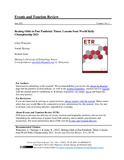| dc.contributor.author | Wanyonyi, Lilian N. | |
| dc.contributor.author | Njoroge, Joseph M. | |
| dc.contributor.author | Otieno, Richard J. | |
| dc.date.accessioned | 2022-06-20T12:55:26Z | |
| dc.date.available | 2022-06-20T12:55:26Z | |
| dc.date.issued | 2022-06 | |
| dc.identifier.citation | Events and Tourism Review, 5(1), 29-39. DOI: https://doi.org/10.18060/26123 | en_US |
| dc.identifier.uri | https://journals.iupui.edu/index.php/etr/article/view/26123 | |
| dc.identifier.uri | http://hdl.handle.net/123456789/6106 | |
| dc.identifier.uri | https://doi.org/10.18060/26123 | |
| dc.description.abstract | The Novel Corona virus pandemic has brought unprecedented impacts on different sectors of economies in countries across the globe. Sports tourism being the worst hit. Sports tourism events are important vehicles of development and mostly embedded in the development plans of many countries. They have been associated with promotion of socio-economic well-being to the host communities. Despite the wide spread of the pandemic, most countries are on the road to recoveries by adopting resilient measures to revamp tourism industry from the shocks of the pandemic. Kenya hosted the World Rally Championship in 2021 as a post pandemic measure to promote sports and tourism industries. The purpose of this paper is to bring to the prominence the benefits of hosting this event in Kenya amidst the pandemic to the host community. The paper adopted a qualitative research design where by 12 key sports and tourism stakeholders were interviewed during the event hosting period. The results indicated that despite the pandemic, the event generated both social and economic benefits to the hosts. Key recommendations were made. | en_US |
| dc.language.iso | en | en_US |
| dc.subject | Sports Tourism, Events, Covid 19, Effects | en_US |
| dc.title | Beating Odds in Post Pandemic Times: Lessons from World Rally Championship 2021 | en_US |
| dc.type | Article | en_US |

